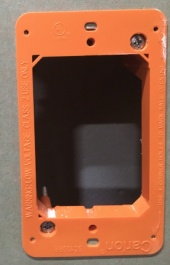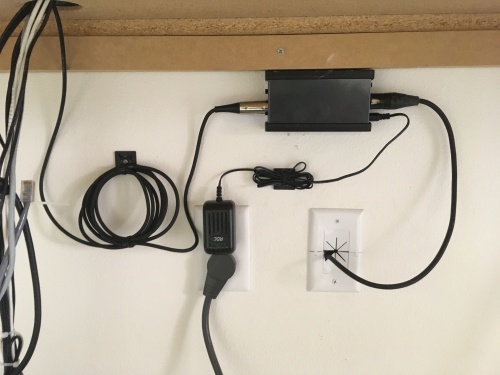Difference between revisions of "Public Talkback - Overhead Speaker"
IVSWikiBlue (talk | contribs) (Created page with "==Required Parts And Tools== * Output Speaker (may be overhead or in wall mounted) * Shure MX393 Boundary Mic * RDL STM-1 Preamp * F-XLR Tail * RDL ST-VOX1 * 22/2 audio ca...") |
(No difference)
|
Revision as of 07:53, 14 April 2021
Required Parts And Tools
- Output Speaker (may be overhead or in wall mounted)
- Shure MX393 Boundary Mic
- RDL STM-1 Preamp
- F-XLR Tail
- RDL ST-VOX1
- 22/2 audio cable
- B-connectors
- Fish Tape or Glow Rods
- Electrical Tape
- Wire Stripper
Installation Instructions
Mounting the Audio
- Decide where the STM-1 will be located, knowing the MX393 mic will need to reach it.
- Using a stud finder, determine the best location to route the 22/2 cable
- Cut a hole into the drywall, large enough to fit a mud ring into it securely.
- Using glow rods or fish tape, pass the 22/2 behind the wall routing to the STM-1
- Note: The wires of the XLR will wire to the +, -, and ground Input on the STM-1.
- Secure a pass through plate to the mud ring mounted for the XLR just ran
- Using anchors and screws, mount the compressor
- Place the MX393. Plug the mic into the F-XLR tail into input of the compressor. Plug the line to the STM-1 into the output of the compressor.
- Mount the STM-1 above the ceiling
- Wire the red to the + and black to the ground power terminals on the STM-1.
- Cut a length of 22/2 from the STM-1 to the camera. Strip the jacket on both ends. Cut away the bare wire and plastic surround the cable inside. Strip away a small piece of the red and black jackets revealing the bare copper wire.
- A short piece of 22/2 cable will also be needed (approx. 1 inch).
- Strip the jacket from the cable and remove all contents keeping only the red cable.
- On both ends of the red cable, strip off a piece of the jacket. Connect one end of the 1 inch audio cable to the +PWR terminal and connect the other end into the +PHNTM terminal.
- Run another length of 22/2 cable from the STM-1 to the audio connectors on the back of the speaker.

